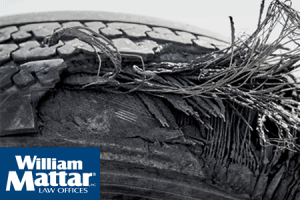Defective Tires
 Many motorists know how essential tires are to a vehicle, especially if they have ever experienced a flat tire. A lot can go wrong with a car’s tires, from low pressure to a worn tread. When tires fail, there can be serious consequences. In 2017, 738 people were killed in tire-related motor vehicle accidents in the U.S., according to the National Highway Traffic Safety Administration.
Many motorists know how essential tires are to a vehicle, especially if they have ever experienced a flat tire. A lot can go wrong with a car’s tires, from low pressure to a worn tread. When tires fail, there can be serious consequences. In 2017, 738 people were killed in tire-related motor vehicle accidents in the U.S., according to the National Highway Traffic Safety Administration.
Tire-related issues can sometimes be addressed through routine maintenance or by replacing worn tires. Other times, a tire issue may be caused by a defect that makes them unsafe or ineffective. Defective tires can cause motor vehicle accidents that result in serious or even life-threatening injuries.
If you suspect a tire defect caused your car accident, contact a product liability attorney at William Mattar law offices. The legal team at William Mattar can investigate your accident case and determine if a defective tire is responsible for the car crash. We will help fight for you to receive the compensation you deserve. Call (844) 444-4444 to speak to us today.
Tire Defects
Tire defects can be the result of a mistake in the manufacturing or design of any given product. A manufacturing defect typically develops during the construction of a product, whereas a design flaw occurs in its original conception. Design defects affect a larger number of the same product, and as a result, product recalls often happen because of this type of defect.
Signs of Tire Failure
Tire failure warning signs may or may not be the result of a defect. According to Consumer Reports, some common signs of tire failure can include:
- Cracks or cuts in the tire sidewall;
- Uneven tread wear;
- Excessively worn tread;
- Sidewall bulges or blisters; and
- Excessive vibration.
Accidents Caused by Tire Defects
Tire defects can go unnoticed until a car accident occurs.
One type of crash caused by defective tires is a “blowout.” A blowout can happen when a tire’s air pressure is too low, causing it to flex and overheat before bursting. When a tire blows out, a driver can lose control of their vehicle and collide with an object or another motorist. Depending on the speed a vehicle is traveling, a blowout can even result in a dangerous rollover accident.
Crashes caused by faulty tires can lead to serious, life-altering injuries. If you’ve suffered an injury after a tire blowout, contact William Mattar.
Tire Recalls
When tire defects are discovered, companies are required to notify the public about the potential dangers by issuing a recall notice. There have been several instances of tire recalls in the U.S. throughout the years.
In 2012, Goodyear—the tire manufacturer—recalled roughly 41,000 tires for tread-related issues that caused the tires to wear out too soon. To check for active tire recalls, you can visit the NHTSA website and enter your vehicle information.
Compensation for a Tire Failure Accident
When a tire failure accident occurs, leading to a serious injury, a tire defect could be to blame. When a manufacturer fails to meet one of their products’ safety standards or fails to report a defect that poses a hazard to consumers, it may be held liable. If this is your situation, you may have the basis for a product liability claim or lawsuit.
Your product liability attorney can collect evidence that the tire defect caused your injuries and investigate whether the manufacturer failed to comply with specific laws. If defective tires caused your car accident, you might be entitled to compensation for economic and non-economic damages. These include, but are not limited to, compensation for medical expenses, lost wages, pain and suffering, and diminished enjoyment in life. Contact an accident attorney to learn more about your legal options.
Contact a Defective Auto Product Attorney Today
If you’ve been injured in a defective tire accident, contact William Mattar law offices. Our experienced accident attorneys can assist you with your claim and work to hold those to blame accountable for the crash. To schedule a free initial consultation, complete our online form or contact us at (844) 444-4444 today.

















